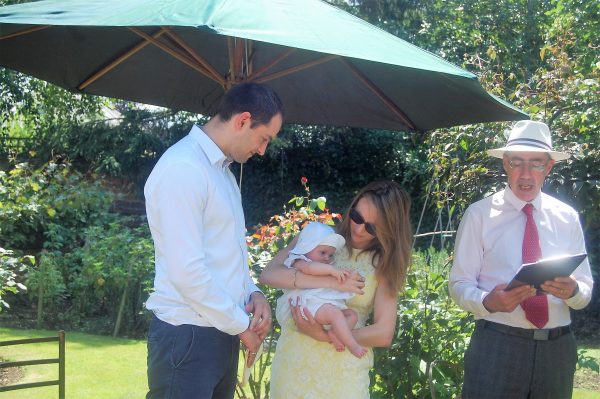
by Michael | Feb 21, 2023 | Blog
It’s always good to celebrate a happy occasion or event! We rather got out of the habit of marking special days because of lockdown. Now we are less timid. And it’s genuinely important to hold such occasions. They are something to look forward to. They help bring people together and encourage a positive mind-set.
If you agree, the next question may be “What shall I celebrate?”.
It sounds obvious, but may repay some restating.
The following is not exhaustive (I’m only choosing three out of many possibilities), but these are the sort of ceremonies I have most often been conducting for people in the decade or so that I have been a celebrant.
Weddings
One lovely way to foster a spirit of joy, unity and support is to celebrate a wedding. The choices are many – not least, the type of ceremony and then the reception. I cover these in other blogs, so will only mention here a couple of areas that you can explore.
The type of ceremony can be religious (eg church), secular (Register Office) or a combination (civil celebrant).
The venue (depending on the type of ceremony you choose) can be in your church, simply in the Register Office, or at a hotel, say, or less conventionally, in the open air.
The reception can be formal or not and can cater for all ranges and types.
Vow Renewals
You may well be approaching an anniversary that ends in -5 or -0. Why not organise an event to mark it?
Or things have changed, and you want to redo and/or proclaim your vows.
The beauty of a Vow renewal is that you have no ties or restrictions. With a wedding, certain words must be uttered (and witnessed); in this case, the wording is up to you (working together with your celebrant). You can celebrate wherever you want – some of the Vow Renewals where I have officiated have ranged from a canal towpath to a tepee to a plush hotel. You can choose a venue that has significance for you. Likewise, the ceremony content can be entirely open to your input.
And then you can mark the event with a reception of your choice.
Naming Ceremonies
I have deliberately not called this section “Baby Namings”. Of course, most people think of babies when it comes to namings, and I have been invited to do a number of these and they have been beautiful, meaningful ceremonies.
However, you can hold naming ceremonies for older people, even adults. The reason could be that someone was never baptised, say, and wants some kind of recognition. You may have adopted a child, so such a ceremony would be appropriate. Or maybe you are blending two families (each with children), so this would be a suitable way to mark the event.
It is possible to mark many other events (even including a separation!), but I hope I have got you thinking how you may be able to celebrate a special occasion. If so, feel free to contact me for more input and help!
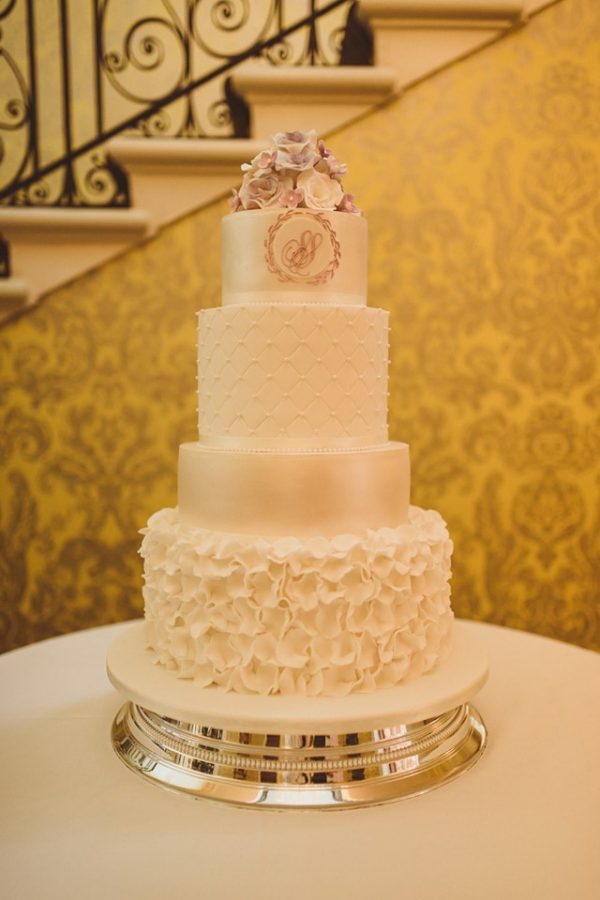
by Michael | Dec 9, 2020 | Blog
Legal matters concerning marriage may not be everyone’s cup of tea. Indeed, the title possibly did not grab your attention. But you can’t marry without certain requirements being satisfied, so please read on.
Exciting news
There is every possibility that, in the course of 2021 or 2022, the law will change. If so, independent civil celebrants will be permitted to train and conduct legal ceremonies. Then you can have the ceremony of your choice and it will be legally binding.
Obviously, churches and register offices will not stop acting as marriage venue possibilities.
Incidentally, as far as legal registration is concerned, this blog only covers births, deaths and weddings. (You don’t need any paperwork to celebrate a Vow Renewal or a handfasting.)
The current situation
Births are usually registered at a hospital. For deaths, the doctor (either at home or, again, at the hospital) normally provides the death certificate, which you take to the local Register Office.
Until such time as the legislation changes, here is what you have to do at the moment for a legal wedding. It’s a little more complex.
Religious weddings
If the wedding is conducted in an Anglican church or synagogue, or according to the Quaker service, then there is normally a member of the institution present who is a registrar. They will ensure the legalities are carried out.
If you’re having a marriage anywhere else, things are different and a little more complicated!
Register Office
You need to register your intention to marry at least 28 days in advance. Then you go to the Register Office (by appointment) with two witnesses, and can get legally married. The ceremony will be totally secular and fairly standardised (so next-to-nothing to differentiate one service from the next).
The Registrars used to be able to come to you. Legislation is going to change for this too, but for now, provided the wedding venue has four solid walls and a roof (basically), the registrars could conduct the wedding for you at your venue. (This would cost several hundred pounds more than attending the Register Office.)
However, due to the Coronavirus situation, registrars are not coming out to venues at all for the foreseeable future.
Another alternative
You can have a civil celebrant-led ceremony. This lets you choose a religious (or partially-religious) or a secular ceremony. The big thing – setting this option out from the other two – is that you can have the ceremony of your dreams. Why? Because the celebrant will work with you in advance to respect and enable your vision. It’s all about personalising, rather than following a standard rubric. That means your ceremony will be unique, and can reflect your personalities and beliefs.
The downside is that the ceremony has no legal validity. So you still have to attend the Registrar-led ceremony beforehand too.
Obviously, another downside – with all these – is social distancing, and the need to severely limit your guest list.
Either way, once you’re legally married, you can have your dream ceremony, conducted by the celebrant, afterwards. To all intents and purposes, that will be your real wedding!
Hopefully, not so painful, was it? But if you have any questions, please feel free to ask me.
Photo: Matt Penberthy
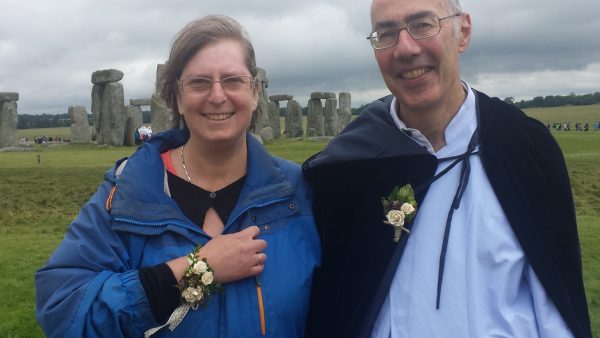
by Michael | Nov 16, 2020 | Blog
It’s mid-November. Christmas adverts on TV are already the norm. It will soon be time for wall-to-wall carols on the radio. The New Year will be upon us sooner than we realise.
A year ago, nobody could have foreseen the direction the new year would take. Without exception, everybody has been affected, to a lesser or greater extent. Job losses, health issues – even, deaths – isolation … the list goes on.
So, what will the future hold? Can we look forward to the next month or two? Dare we be positive about 2021?
Of course, I have no crystal ball. The threatened ‘spike’ may materialise. The virus may, however, have done its worst. Whether improved testing and the emergence of a vaccine will actually make a difference remains to be seen. We simply cannot tell.
All we can do is to let life go on, as best we can.
That means making plans again.
If you have forthcoming happy events, do consider marking them. It’s important to us as humans to celebrate. It might be a wedding, or an anniversary (especially, one ending in a -5 or -0). It might be a naming or a handfasting. It could certainly be a vow renewal. Just possibly, a promotion at work. But don’t ignore it.
Of course, whether you hold a micro-event or something larger depends on the date of your ceremony and what the current regulations will be.
So it may be a gamble. Thus it may be easiest to arrange something that can be adapted at fairly short notice. That probably entails liaising with your venue (if you’re booking one at all) and/or suppliers, and checking how flexible they are.
I believe that things will ease up in 2021 (may my words not come back to haunt me!). As social animals, we do need to break the isolation at some point. Hopefully, this can be done in a controlled way, and a ceremony may be exactly what the doctor (!) ordered.
If you are thinking of organising something a bit special, then please have a chat with me.
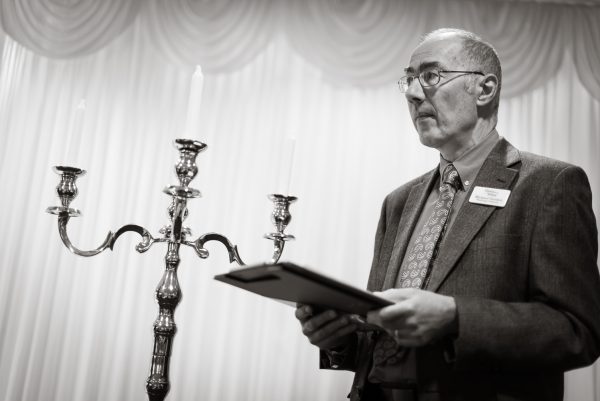
by Michael | May 6, 2020 | Blog
It’s not that easy to come up with a useful or informative blog every week. Even less so under Lockdown. Hardly anything is happening in the world of weddings. Still less in the world of Vow Renewals and Namings. But so much seems to be happening in the world of funerals that it’s impossible to keep up!
So, rather than tell you what you already know or something that is already out of date, here is a bit about me and how I found myself in the world of celebrancy.
Background
I came from a lower middle-class Ealing home, and was pretty conventional till my mid 40s. To summarise incisively, I was a teacher for 25 years, but was to lose my mojo. In fact, I definitely experienced a mid-life crisis, and went through a pretty unpleasant couple of years.
However, unexpectedly, this became a time for personal development. I went into network marketing (health and wellness). I loved the products and that I could help others in quite surprising ways, but the money wasn’t to be earned there (to prosper you need to build teams, and I wasn’t great at that). So I lost a lot of money – yet I have never completely stopped this work.
On the other hand, network marketing demands personal study and growth. I read self-help books, attended workshops and even took on a coach. I began to change, quite without realising it.
When the opportunity for something quite different arose three or so years later, I was ready for it (at least, subconsciously).
The Damascene moment
I met a civil celebrant at a business networking meeting. Having never heard of such a job, I asked him what it entailed. His enthusiasm was infectious, and I was almost hooked. I rang him soon afterwards with a few questions – one of which was “how do I train?” Decision made.
So I trained. I plunged into a profession that I might have dismissed earlier. After all, as far as I had been concerned, a wedding was either a full religious or a secular Register Office ceremony. Surely people shouldn’t be encouraged to choose how their big day should be marked?!
I had been used (by and large) to teaching and presenting. That was largely a one-way process (the way I did it!). My new profession would encourage me to go beneath the surface. I had to help people make their own (informed) choices. It would involve listening to people and understanding their vision by asking the right questions. I would have to guide and advise them, working together with them to achieve their dream. The icing on the cake would be attending beautiful venues to conduct a wonderful ceremony and sharing in their delight.
Seven years down the line, I am still in love with my profession. As I have worked at my delivery, business results have become better – but that was until Coronavirus. Now crystal-ball-gazing is impossible and I may have to rebuild my business from the bottom up.
However, I am optimistic. The work will be out there – after all, why shouldn’t people mark their big day as they would wish? I intend to continue to be available and to deliver an excellent service.
I shall be delighted to deliver dreams as before.
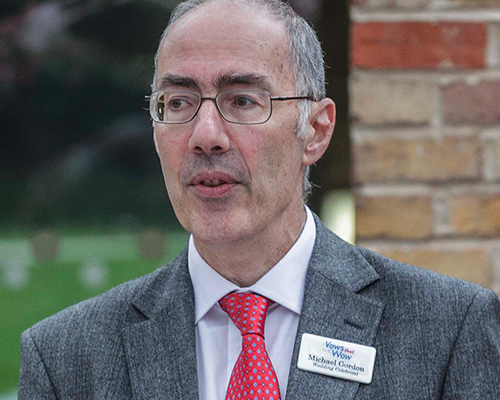
by Michael | Mar 17, 2020 | Blog
I make no apology for adding a few random thoughts to the thousands of COVID-19-related posts already published. It’s a pandemic, after all, so we can’t help but be affected in some way. Moreover, nobody really knows what will happen next.
I am a civil celebrant, not a doctor. My thoughts may not resonate as sensible or practical. Things are moving very quickly. What I say today may be invalid by tomorrow. However, here goes.
Funerals
From my perspective, I am currently still being asked to conduct funerals. At my latest, I had planned to invite the mourners to use discretion and be aware of the possible consequences of making physical contact with each other. However, as soon as they met, they fell into each others’ arms, so there was no point. It’s a difficult one, because a funeral is so emotive, and touch can be so welcome, even necessary.
For my part, I apologised individually, but declined physical contact.
It may well
be that funerals as we know them will be suspended in favour of direct
cremation, say. That means that there would be no ceremony whatsoever (although
a memorial service could be organised for when things have calmed down).
At the moment, I am contacting families by phone and giving them the option of discussing the Order of Service in their home or by phone/Skype etc. Nobody has asked me to make the house call, but if I did, I would again decline physical contact with them, and would take precautions, such as not eating or drinking anything, and use plenty of hand wash.
Celebrations
At the time of writing, gatherings of more than 40 people are being discouraged. That may very well impact on weddings, vow renewals, namings and the like. The latter two could probably be postponed without too much trauma, as they usually entail much less planning than a wedding.
Weddings are
likely to be bigger and to have been planned from a year or so back. Deposits
will have been paid, at the very least, and cancellation penalties may exist in
the terms and conditions of some suppliers. Hopefully, such penalties will not
be invoked under the circumstances, and insurance cover may be in place anyway.
I think that the next two weeks will see the virus peak over here, and, hopefully, after that, normality will be restored, at least gradually. My advice to couples is not to panic and don’t cancel unless you are told to. You have more chance of being reimbursed if you respond to the government instructions, rather than assuming the worst and second-guessing. True, you want to give maximum notice to guests, but these are unique circumstances. It may be worthwhile getting in contact with them, though, to reassure them that they are not forgotten.
So “wait and
see” is my advice, frustrating as it may be, and hope and pray that the gods
will be with you.
At the very
least, you’ll probably have some stories to tell your grandchildren one day …!





